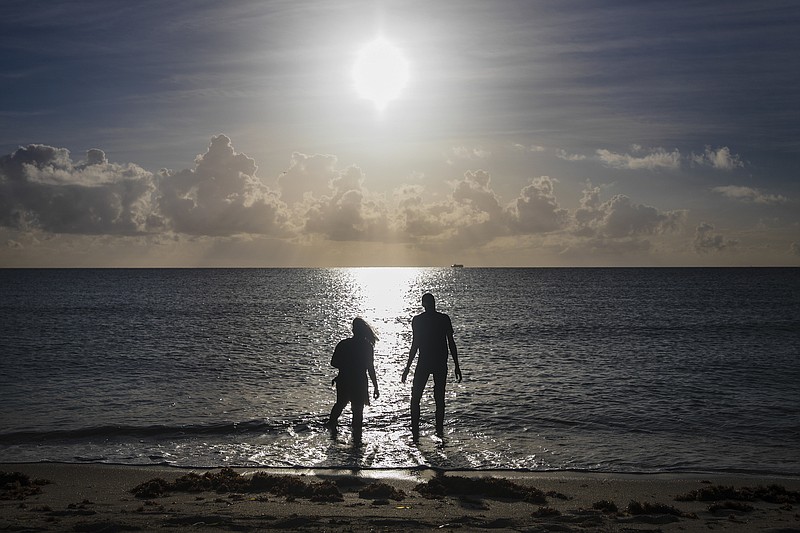We hear and read a lot about how climate change will make sea levels rise. We don't hear or read so much about the other effects of climate change on our oceans. At least we didn't until last Wednesday when a major new United Nations report dropped.
The headline finding is still about sea-level rise. And it could be worse than we've thought.
The projection of worst-case sea-level rise by 2100 now is about 10 percent higher than predicted five years ago, according to the report, titled "Special Report on the Ocean and Cryosphere in a Changing Climate." The report is the last in a trilogy of special reports during the past year from the United Nations–led Intergovernmental Panel on Climate Change.
But sea-level rise is only one of the concerns of climate change listed in the newest report, which includes a view stretched "from the highest mountains to the bottom of the ocean," according to Ko Barrett, a vice chairwoman of the IPCC and a scientist at the National Oceanic and Atmospheric Administration.
Barrett says climate change is going to reshape every system made of water on Earth.
As the ocean warms (the rate of warming has more than doubled just since 1993), seafood safety will decline: Mercury will accumulate in fish, and toxic bacteria will become more common, threatening seafood harvests and sickening people. In the Arctic, where people rely on seafood diets, food and waterborne illnesses already are on the increase. Did we mention that fish and seafood provide about 17 percent of the world's animal protein?
It goes without saying that we'll see extreme coastal-flooding events like Hurricane Harvey or Katrina. Floods that used to happen every century will happen in some places every year. And yes, such storms will dump ever more water. The warming oceans also will increase the frequency of extreme El Niño and La Niña events, inducing "whiplash between wet and dry periods," Andrea Dutton, a climate scientist at the University of Wisconsin, told a reporter with The Atlantic magazine.
Thanks to marine "heat waves," half of the coral in the Great Barrier Reef died between 2016 and 2018. Scientists say it will take at least 15 years to recover, but given the pace and spread of marine heat waves, it probably never will.
Equally striking are the migrations scientists are seeing among ocean sea creatures. Since the 1950s, entire populations of fish and seafloor animals have moved toward the poles at a rate of up to 50 miles a decade.
Think of this as the microcosm of future people migrations above those seas.
There's more. Climate change's effects seem to be speeding up.
The report warns that seas are now rising at a pace "unprecedented over the last century." The rate of global sea-level rise was 2.5 times faster from 2006 to 2016 than it was for nearly all of the 20th century.
"In the Antarctic ice sheet, the rate of mass loss had tripled relative to the previous decade," Dutton told The Atlantic. "In Greenland, it's doubled over the past decade."
And that could well speed up even more if, as the report points out, the Antarctic ice sheet should collapse. For decades, scientists have posited that glaciers in West Antarctica have "wet feet," meaning their front face sits in the water, just as ice sits in a water glass. But the massive glaciers don't float around because the weight of the ice above the waterline keeps them stuck to the seafloor - so far. But as the glaciers melt, more and more of that mass falls below the waterline. Eventually, the mass above the waterline will no longer keep the glacier stuck to the seafloor. It will float off its foundation. Then it could quickly become like many melting ice cubes.
Meanwhile "many earthbound glaciers, particularly in Washington State and the Mountain West, will disappear within the next decade and - at the latest - within a century," said Regine Hock, an author of the report and a geophysicist at the University of Alaska Fairbanks, at a news conference last week. What will that mean for cities like Phoenix and Los Angeles that rely, at least in part, on water from mountain glaciers to quench human thirst, grow crops and produce electricity?
The report is a stark and depressing assessment.
Taehyun Park, of Greenpeace, told The Guardian: "The science is both chilling and compelling. The impacts on our oceans are on a much larger scale and happening way faster than predicted. It will require unprecedented political action to prevent the most severe consequences to our planet."
So what are we going to do about it? Start today. Call or visit your city, county, state and national elected officials and force change.
